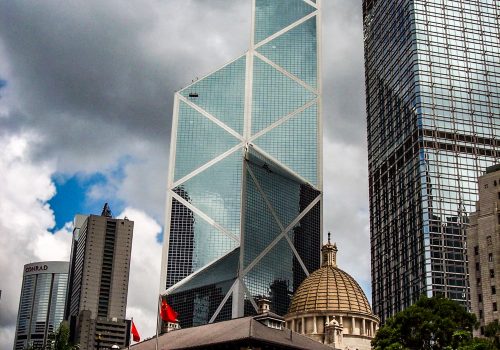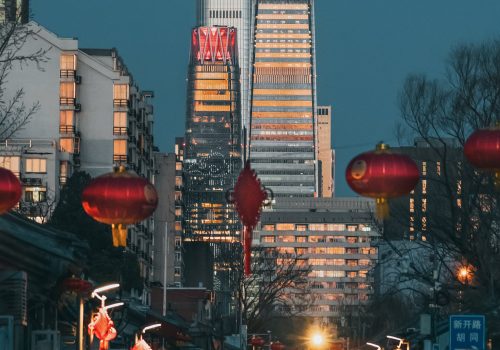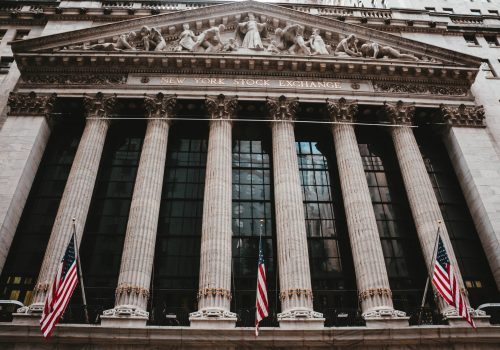China’s capital markets in the shadow of the CCP
Western investors are increasingly active in Chinese capital markets during a time of rising US-Chinese geopolitical tensions. These tensions are contributing to US-Chinese “capital wars,” or the use of capital markets and financial instruments to inflict harm. The transatlantic relationship may also be affected by US-Chinese financial conflict, as the United States could request that its European allies align their financial relationship with China with the United States’ and the emerging allied strategic approach to China.
The three major players — China, the United States, and Europe — will be addressed in three separate pieces. This first essay considers the highly politicized nature of China’s capital markets. The second piece will focus on evolving US-Chinese capital market restrictions. The third will discuss why the European Union needs to develop a strategic approach to financial geopolitics as a result of the evolving US-Chinese relationship.
Two aspects of China’s economy will frame this essay. First, politics are increasingly influencing Chinese businesses. Second, this politicization may have significant implications for those investing in Chinese financial assets. The politicization of Chinese business matters because, as the Fed recently warned, as Western investors grow more exposed to Chinese capital markets, the global economy is increasingly vulnerable to economic instability in China. The particularly political nature of much of China’s economy could make its markets disproportionately vulnerable to political and geopolitical upheaval, more so than Western-style liberal capitalist economies.
Until Xi Jinping’s rise to power, many people — at least in the West — believed that China’s economy would gradually transition from state capitalism towards a free market economy. Instead, in recent years, some observers have noted the rise of ‘CCP Inc.’ as the model for Chinese economic governance under Xi Jinping. This implies that the Chinese Communist Party (CCP) continues to expand its role in the corporate governance of both state owned and “private” businesses. In parallel, Xi Jinping has also ordered that the Chinese military needs to have greater access to civilian business for technological innovation and know-how.
The reassertion of political power over China’s businesses by the CCP means that China’s economy is increasingly controlled, or at least co-managed, by the government. Xi Jinping has reasserted the CCP’s control in a range of economic sectors, with real estate and finance most significantly affected.
A first clear marker were the arrests, jailings and even executions of several high-level Chinese tycoons who controlled large financial enterprises. The events clearly indicate that the Party has been taking back control. Chinese companies with significant global assets, such as An Bang, Dalian Wanda, Fosun, HNA, Huarong Asset Management, and Alibaba’s Ant Financial have been liquidated and stripped, nationalized or forced to sell their assets, impeded from raising capital abroad, and/or saw their leadership arrested. As with many Chinese companies, these companies had underlying problems including corruption and malfeasance — but the authorities’ actions were out of proportion to the problems. In Ant Financial’s case, its CEO, Jack Ma, may only have been too outspoken for the regime’s taste. In any case, it appears these companies and their leadership fell out of grace with the political leadership.
At the same time, the Party has become much more active in Chinese companies beyond State Owned Enterprises (SOE). Communist Party cells and committees are now present in “private” companies. They may also, to different degrees, exert influence over corporate management decisions. Businesses operating in China are also subjected to a corporate social credit system, which “nudges” companies to act in line with the Party’s domestic and international political agenda. Through state investment funds, as well, the Party has emerged as the – indirect – shareowner in large SOEs. The authorities had previously sought to manage SOEs through regulations and loans, instead of seats in the boardroom.
An additional complication is the role of the People’s Liberation Army (PLA) and the Chinese military-industrial system in China’s “civilian” economy. The military aspect in China’s economy is largely beyond the scope of this article. Briefly, it is important to note that the civilian and military parts of the Chinese economy are deeply intertwined through business ecosystems, conglomerates, dual use technology, and infrastructure. In communist China, the interconnectedness of military and civilian aspects has a long tradition, and the role of the PLA in business could be considered a defining element of China’s economy. In recent years the policy concept of military-civil fusion has deepened the reach of the PLA or PLA-associated industries in China’s business ecosystems. Under military-civil fusion, virtually all civilian technology companies are obliged to share their technology with the military-industrial complex.
This political and military reach into China’s businesses can become problematic for investors. In Chinese capital markets the financial assets of many Chinese companies are traded. But investors, Chinese or foreign, may be unaware of the actual or potential influence of party-political and military-strategic aspects on the businesses they have invested in.
The reality is that China’s political leadership often consider capital markets as subject to the Communist Party’s political considerations and foreign policy objectives, to the same extent that state-owned enterprises SOEs, private businesses, and technology companies are. The Economist recently noted that “China is pursuing a strategy of asymmetric decoupling: reducing its dependence on the West even as it seeks to increase the West’s [financial] dependence on China.”
Whereas mainland Chinese companies previously listed abroad to raise capital, many have begun raising capital at home through the Shanghai and Shenzen exchanges, which are under the immediate control of China’s authorities. The authorities are actually increasingly limiting Chinese companies’ ability to list on foreign exchanges, thus further reinforcing China’s official regulatory influence over these companies.
At the same time, China’s onshore markets have become more accessible to foreign portfolio – mainly institutional – investors through different market access schemes. Whereas these foreign investors previously invested in offshore listing of Chinese assets, they can now invest in Chinese stocks, bonds, and futures in the onshore market. After index providers like MSCI and FTSE included and progressively increased the weight of Chinese assets in their respective stock and bonds indices, the volume of foreign portfolio investment holdings of Chinese assets rose sharply, reaching 1.1 trillion US dollar in the summer of 2021.
In conclusion, the CCP’s control over Chinese businesses has increased at the same time as more Western capital is invested in China’s economy. As a result, Western investors are increasingly exposed to Chinese political and foreign policy dynamics, and, as will be explored later in this series, to US-Chinese geopolitical tensions. Furthermore, some argue, Western investors in China may actually be strengthening the CCP and the PLA. This confluence may bring Wall Street’s bullishness on China into conflict with Washington’s bearishness.
For now, Western investors should be aware and seek to understand the implications of non-financial Chinese political risk to their portfolio. From a macroprudential perspective, financial supervising authorities should also consider how Chinese political and military dynamics affect the Chinese economy and how that can ripple through the global economy. Western security organizations should also keep a clear eye as to how global financial flows –—and public-private financial entanglements — shape geopolitics.
Dr. Elmar Hellendoorn is a nonresident senior fellow with the GeoEconomics Center and the Europe Center.

At the intersection of economics, finance, and foreign policy, the GeoEconomics Center is a translation hub with the goal of helping shape a better global economic future.


